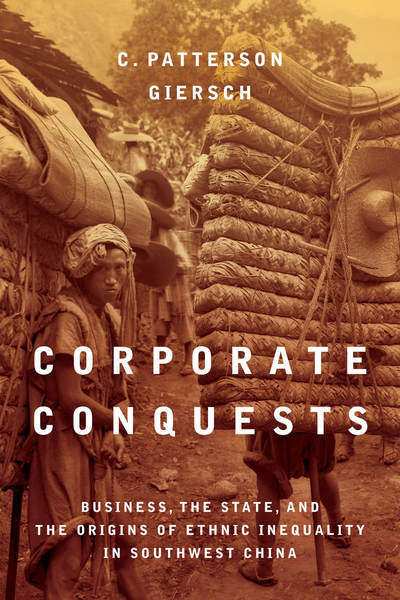
2020
304 pages.
from $35.00
Paperback now $17.50 (50% off)
Hardcover ISBN: 9781503611641
Paperback ISBN: 9781503612167
Ebook ISBN: 9781503612174
Tenacious patterns of ethnic and economic inequality persist in the rural, largely minority regions of China's north- and southwest. Such inequality is commonly attributed to geography, access to resources, and recent political developments. In Corporate Conquests, C. Patterson Giersch provides a desperately-needed challenge to these conventional understandings by tracing the disempowerment of minority communities to the very beginnings of China's modern development. Focusing on the emergence of private and state corporations in Yunnan Province during the late 1800s and early 1900s, the book reveals how entrepreneurs centralized corporate power even as they expanded their businesses throughout the Southwest and into Tibet, Southeast Asia, and eastern China. Bringing wealth and cosmopolitan lifestyles to their hometowns, the merchant-owners also gained greater access to commodities at the expense of the Southwest's many indigenous minority communities. Meanwhile, new concepts of development shaped the creation of state-run corporations, which further concentrated resources in the hands of outsiders. The book reveals how important new ideas and structures of power, now central to the Communist Party's repertoire of rule and oppression, were forged, not along China's east coast, but along the nation's internal borderlands. It is a must-read for anyone wishing to learn about China's unique state capitalism and its contribution to inequality.
About the author
C. Patterson Giersch is Professor of History at Wellesley College. He is the author of Asian Borderlands (2006).
"An important book. Accounting, management, and business history masquerade as mundane technical fields. But C. Patterson Giersch, historian of borderlands and ethnicity, shows how deceptive this façade can be, tracing the commercial 'networks of exclusion' that helped parcel out Asia's interior between Chinese and British imperialisms. The discoveries in this book are indispensable to our understanding of how modern China as we know it came to be."
—Rian Thum, University of Nottingham
"In Modern China, it is well-known fact that economic development and the concentration of wealth are profoundly uneven, particularly along ethnic and geographic lines. But why? In a bold new work that is at once empirically rich, tenaciously local, and vividly narrated, C. Patterson Giersch charts out the deep, late imperial origins of Chinese economic inequality."
—Thomas S. Mullaney, Stanford University
"[Giersch's] attention to the details of life in the borderlands is impressive, and the arguments about the role of local corporations in forging a path for intensifying central control of the economy and the usefulness of ethnic prejudice in this effort are convincing. Recommended."
—K. E. Stapleton, CHOICE
"In this ground-breaking book, [Giersch] has offered the reader important insights regarding the balance between local control and state directives in the twentieth-century economic development of southwest China."
—James Anderson, H-Asia
"Giersch, a brilliant writer who tells an engaging story about visionary figures, entices readers throughout the book with potential alternatives to disempowered development: What would have happened if indigenous communities were allowed to pursue their own developmental agenda? What could have been different if non-Han elites were more involved in the management of borderlands resources? Giersch encourages readers to boldly imagine how history could have unfolded differently. Tai elite Fang Kesheng ... for example, petitioned in1947for economic cooperation between the Chinese state and indigenous elites. If his proposal were taken more seriously, he might have been able to push back against the'power of private corporations'and the'developmental discourse of subordination'(p.192). Maoheng, once a trading giant in Yunnan, made significant progress in mechanizing textile production before the party-state took over management...and forced Yunnanese trade towns into'agrarian isolation'(p.200), all in the name of economic planning and borderlands development. Ifind the unfortunate turn of events heartrending ...
"This well-researched book offers nuanced information and critical analysis about the rise and demise of private corporations in Yunnan and their implications on modern Chinese history. It is an important reading to anyone interested in the politics of economic development and ethnic inequality in Southwest China and beyond."
—Chun-Yi Sun, China Review International